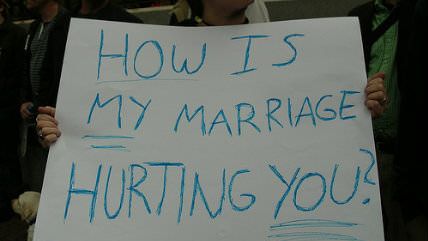Who Framed the Right?
When "logical" arguments against same-sex marriage break down, what is left?

Conservatives are now complaining that they're losing the fight over same-sex marriage because the left has done a better job of framing the issue.
For instance, Rush Limbaugh said last week that conservatives lost control of the definition of marriage, while the liberal side "really excels at changing the language to benefit them politically, and they do it in such a way that a lot of people on our side have no idea what's happened until it's too late and the issue is already lost."
Writing in National Review, Mona Charen makes a similar point: Liberals are winning by framing opponents of same-sex marriage (SSM) as bigots: "the most potent argument in the SSM quiver is the race analogy. During oral argument at the Supreme Court, advocates argued (as they have elsewhere) that impairing the right of homosexuals to marry is analogous to proscribing interracial marriage. If that's true, it's game, set and match. If SSM is like interracial marriage, then the only possible motive for opposing it is bigotry."
All of a sudden, conservatives are sounding a lot like George Lakoff—the liberal linguistics professor who gripes about the über-powerful message machine of the American right.
Conservatives, Lakoff says, "have a huge, very good operation, and they understand their own moral system… and they understand how to talk about it, and they are constantly updating their research on how best to express their ideas." Those clever little devils!
But saying the other side wins simply because it frames the issue better is, in a way, saying it wins because voters are too stupid and gullible not to realize your own side is right. This might feel good, but it is a problem—because it allows you to avoid engaging the arguments other people find so persuasive.
Take the analogy between interracial marriage and gay marriage. It does not work simply because it has been repeated loudly and often. It works because it fits. If proponents of SSM went around claiming the argument against gay marriage sounds just like the argument for dropping the atom bomb on Hiroshima, we'd all be scratching our heads. It's an apples-to-aardvarks comparison.
The racial analogy, however, fits rather neatly—because the arguments against racial mixing and those against same-sex marriage sound so similar and work the same way. Both attempt to rebuff a demand for equal treatment by appealing to the Bible, natural law and 2,000 years of tradition (see this article for some examples).
Another reason SSM proponents have succeeded in portraying some opponents as homophobic is that, sorry, some of them really are homophobic. True, plenty are not: Many SSM foes oppose gay marriage out of sincere religious conviction, while simultaneously loving their gay and lesbian neighbors and wishing them well. But some of those who are not bigoted against gays might be leaving themselves open to that accusation by virtue of the fact that the nonbigoted arguments they present are so weak.
Example: A couple of months ago a writer at The Washington Post wondered how straight people could possibly think gay unions diminish the value of their own marriages. The Wall Street Journal's James Taranto took issue with this, claiming it was "a straw man. We've been following this debate for years, and we've never heard opponents claim that same-sex marriage would diminish or endanger their own marriages. Their arguments are based on morality, tradition and worries about the effects on the institution of marriage…"
Really? The argument, then, seems to be this: While gay marriage might not ever harm any individual straight marriage, it still damages the institution of marriage as a whole.
How, exactly, does it do this? Is there is some ontologically separate entity called Marriage that exists independent of all the marriages of all the couples in the world? There would have to be, according to the institution-of-marriage argument. But that makes no sense. After all, you would not say a virus "threatens humanity" if, in fact, no individual human person was ever harmed by the virus. Humanity is simply the sum of the humans in it. Nor could one reasonably contend "society" was harmed by the introduction of—oh, let's say rock music—if nobody ever suffered any harm from rock 'n' roll. If individual marriages do not suffer from the existence of gay marriage, then neither can "the institution of" marriage.
It's this sort of foolishness that leads some proponents of same-sex marriage to question the motives of the other side. If you continue to defend a proposition with vehemence even when your rational arguments don't hold up, then people can be excused for thinking you have other, less rational reasons for doing so.
This article originally appeared in the Richmond Times-Dispatch.
